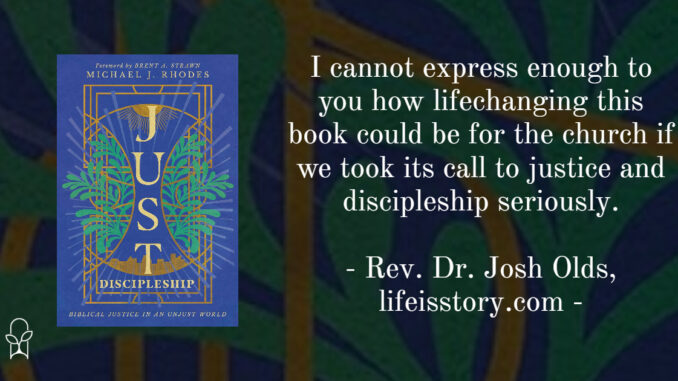
Published by IVP Academic on August 8, 2023
Genres: Academic, Non-Fiction, Theology, Social Justice
Buy on Amazon
Goodreads

Many Christians and churches are rediscovering that God cares deeply about justice, but opinions abound as to what an approach to biblical justice might look like in contemporary society. What exactly does the Bible mean by justice, and what does it have to do with poverty, racism, and other issues in our world? More importantly, how do we become the kind of people who practice justice?
Biblical scholar Michael Rhodes argues that the Bible offers a vision of justice-oriented discipleship that is critical for the formation of God's people. Grounded in biblical theology, virtue ethics, and his own experiences, he shows that justice is central to the Bible, central to Jesus, and central to authentic Christian discipleship. Justice stands at the heart of Scripture. Following Jesus demands that we become just disciples in an unjust world.
Christian discipleship is commonly considered to be a personal spiritual practice. Discipleship means reading the Bible and perhaps memorizing parts of it. It means praying more and maybe writing in a journal. It means the cultivation of spiritual disciplines. But what if it also meant the cultivation of justice? In Just Discipleship, Old Testament scholar Michael Rhodes makes the case for the pursuit of justice being central to the framework of Christian discipleship. Discipleship isn’t just private spiritual practice; it is the public outworking of the indwelt Spirit that results in God’s kingdom coming to earth in the form of Christ’s disciples.
Rhodes divides Just Discipleship into four parts, each addressing different aspects of justice-oriented discipleship. Part one offers an introduction, setting the context for the content to come. Part two, “Becoming Just Disciples” takes an in-depth look at four different biblical concepts—the Deuteronomic feasts, the justice songs of the Psalms, the wisdom of Proverbs, and the imitation of Jesus in 1 John. I loved this section. The Old Testament in particular is overlooked by many in the modern church, but it tells us so much about how God intended political systems and empowered peoples to act. Rhodes is scholarly, but accessible. He draws on a rich tapestry of scriptural examples to show how the call to justice is deeply embedded in God’s vision for the community of faith. The book is both convicting and inspiring, urging readers to adopt a holistic approach to discipleship that includes working for justice in all areas of life.
Part three, “Becoming a Just People,” delves into more communal aspects of justice, including a discussion on ecclesial reparations and the role of the church in multi-ethnic communities. Here, I especially loved his deep dive into the year of Jubilee in Leviticus 25 and how we might apply this radical economic concept to modern times. It’s my personal belief that the Jubilee is the solution to our current economic disparity and to hear Rhodes exhort the same while giving practical examples of what that might look like was encouraging.
The final part, “Discipling Politics,” examines the role of Christians in the political sphere, with a focus on how biblical figures like Joseph and Daniel navigated their political contexts. I cannot express enough to you how lifechanging this book could be for the church if we took it seriously. Unfortunately, many in the church are running away from justice issues in attempts to maintain their own power and the status quo. With conviction and clarity, Just Discipleship presents a call to biblical social justice that cannot be ignored. It is a vital resource for hose grappling with questions of justice in the modern world, offering a biblically grounded, thought-provoking, and practical guide to living out the justice of God.
